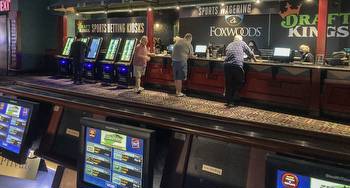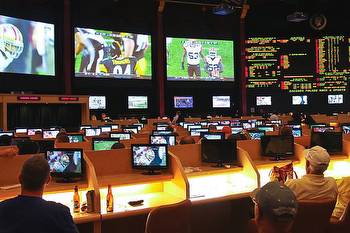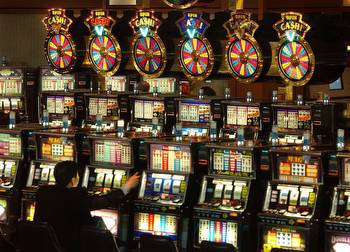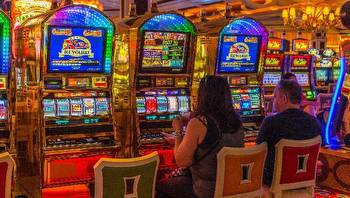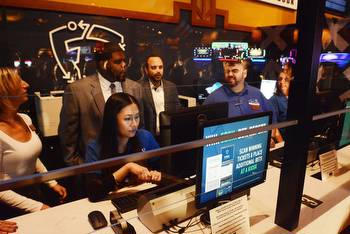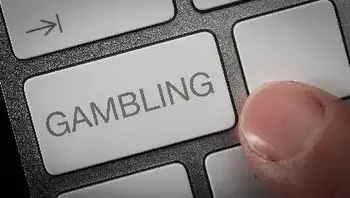With an explosion of sports betting and online gambling, Connecticut braces for a potential increase in problem gambling

Online sports betting and casino gambling barreled into Connecticut this month, prompting worries about an explosive increase in already common problems blamed on gambling addiction: heavier personal debt, broken relationships and crime.
After years of debate and on-again, off-again legislative attempts to extend gambling beyond the state’s two tribal-owned casinos, sports betting, lottery games and casino gambling were authorized last week in Connecticut on phones, tablets, laptops and other devices.
“You now have a casino in your pocket,” said Cam Adair, founder of Game Quitters, a global support community for video game addiction.
As gamblers have access to a vast range of gambling with the tap of an app, casinos, too, can easily reach gamblers by emailing offers and sending notifications to phones. “It’s very different than you choosing to go somewhere,” Adair said.
The Department of Mental Health and Addiction Services says broader access to gambling with online betting exposes gamblers to “vulnerabilities,” such as financial difficulties, troubled relationships with family members and significant others, poor work performance, an increase in money-related crime and a reported increase in severity of mental health related symptoms.
Adair said young people are particularly at risk because they see their parents gambling online or betting on sports teams. Gambling in Connecticut is legal for those 21 and older.
“The earlier they start, the easier it is to develop problems in the future,” he said.
A demographic group he’s watching is men in college between the ages of 21 and 24 who are more prone to problem gambling than others, particularly because of the appeal of sports betting. Problem gambling is an “almost silent issue” on college campuses, he said.
Opting out
As the legislation moved forward, negotiations between the administration of Gov. Ned Lamont and the Mohegans, who own and operate the Mohegan Sun, and the Mashantucket Pequots, who run Foxwoods Resort Casino, focused on apportioning the millions of dollars in revenue from expanded gambling and changing the compacts governing casino gambling in Connecticut.
But advocates for problem gamblers said more could have been done to protect bettors who are prone to addictive behavior.
Diana Goode, executive director of the Connecticut Council on Problem Gambling, said Connecticut does not make it easy for gamblers who know they have a problem to “self-exclude,” or submit to bans in the casinos and online.
Self-exclusion is “incredibly difficult,” she said — gamblers must notify the state Department of Consumer Protection and the two casinos. Advocates are calling for a simpler approach for gamblers to self-exclude.
Stopping short of self-exclusion, casinos can limit how much time and money a gambler spends, giving players the ability to set financial limits on their accounts.
Goode also said a problem gambling phone number, required to be advertised to offer help to problem gamblers, is too small on billboards and is ineffective.
Sen. Cathy Osten, co-chairwoman of the legislature’s Public Safety and Security Committee, said legislation that broadened gambling in Connecticut “significantly increased” funding for problem gambling and provided for self-exclusion that was not available when Mohegan Sun and Foxwoods opened in the 1990s.
“When slots came in there was nothing,” said Osten, D-Sprague.
Rep. Maria Horn, the House chairwoman of the committee, said she and colleagues worked the legislation as a consumer protection bill to complement the agreement between Lamont and the casinos. State legislators will likely return to the issue next year, she said.
Online gambling could be more effective in identifying problem gambling “than sometimes we do in person,” she said, citing age-restrictions enforced by digital technology.
The Connecticut Lottery Corp. has made an annual contribution of $2.3 million to a chronic gamblers treatment rehabilitation account since 2013, according to the Department of Consumer Protection. An additional $1 million was authorized in the recent legislation.
Worsening problem?
Goode expects problem gambling will worsen with expanded games in Connecticut, but not immediately.
“It takes a little time before people realize they did not win and they have a problem,” she said. “You could win and that’s what makes it so addictive and keep going.
“When you ask someone their gambling story it usually starts with a big win.”
The industry says technology that brings an immediacy to gambling also may be used to detect and help players avoid problem gambling. Tools used online can detect unusual behavior that indicates possible problem gambling, according to iDevelopment and Economic Development Association, an industry trade group.
Industry representatives say they stop marketing messages to flagged players and provide instructions for players on how to set limits, according to iDevelopment, which represents numerous companies, including DraftKings, the sports betting partner of Foxwoods.
Guidelines posted by Mohegan Sun on its website caution bettors that gambling is not essential to have a good time, warns against borrowing to gamble when money cannot be repaid and that gambling when lonely, angry or depressed can result in excessive losses.
And in a striking comment for a casino, it reminds players that the odds are “always against winning.”
About 1.1% of Connecticut adults, or 39,665, are believed to have a gambling disorder, according to the National Survey of Problem Gambling Services by the National Association of Administrators for Disordered Gambling Services and cited by the state Department of Mental Health and Addiction Services.
A World Health Organization study in 2017 shows that increased gambling leads to a slight increase in gambling disorder, but it’s not a large fluctuation.
Progress over the past 30 years, such as problem gambling councils and including gambling disorders in the Diagnostic and Statistical Manual of Mental Disorders, is “not nearly enough,” he said.
“What’s surprising to me is that gambling as an issue isn’t debated,” Adair said. “No one is debating whether gambling is a serious issue that can harm someone’s life.”
The state’s confidential problem gambling helpline is available 24 hours a day at 888-789-7777. Additional resources for those seeking help can be found on the state Department of Mental Health and Addiction Services problem gambling page.














